The Vape Crackdown: U.S. Bans, Court Rulings & What It Means
1. Introduction
In 2025, the United States reached a major crossroads in its battle over vaping. Lawmakers, regulators, and courts are responding to escalating concerns about youth vaping, the proliferation of flavored and disposable e-cigarettes, and the environmental toll of vape waste.
What began as isolated regulations has now become a nationwide crackdown. New bans in states like North Carolina and Wisconsin, a Supreme Court ruling empowering the FDA’s authority, and renewed scrutiny of online vape sales and mail-order loopholes are reshaping the entire e-cigarette landscape.
“These companies are targeting our children with candy-flavored poisons,” said NY Attorney General Letitia James, as she announced a lawsuit against distributors of Elf Bar and Puff Bar (apnews.com).
This blog post unpacks the legal developments, public health motives, and industry responses driving the crackdown—and what these changes mean for you.
2. Why the U-Turn Against Vapes?
The rapid shift against flavored and disposable vapes can be traced to three major concerns:
1. Youth Usage & Flavor Appeal
Flavored e-cigarettes remain the number one on-ramp for youth nicotine addiction. According to recent CDC reports, 85% of teens who vape prefer flavored products. That includes fruit, candy, dessert, and mint flavors—clearly marketed with younger consumers in mind.
The FDA’s PMTA (Premarket Tobacco Product Application) framework was designed to review whether a product is appropriate for the protection of public health. Since 2020, the FDA has rejected thousands of flavored e-cigarette applications, often citing insufficient evidence that they help adult smokers quit or are safe for youth exposure.
“The overwhelming evidence shows flavored vapes are hooking a new generation on nicotine,” said Mitch Zeller, former Director of the FDA’s Center for Tobacco Products.
2. Environmental Harm of Disposables
Disposable vapes have become a fast-growing contributor to electronic waste. A single-use device contains lithium-ion batteries, plastic, heavy metals, and nicotine residue—all posing toxic disposal challenges.
California lawmakers, for example, are pushing AB 762, a bill to ban all single-use disposable vapes by 2026. Their rationale is both environmental and public health–focused:
“These devices clog landfills, pollute communities, and pose a long-term ecological threat,” said Assemblymember Luz Rivas, co-sponsor of the bill (apnews.com).
3. Regulatory Gaps and Black Market Risk
Despite existing restrictions, a robust black market for flavored vapes continues to thrive—mainly through imports and online retailers that evade FDA rules and PACT Act shipping restrictions.
Retailers and regulators alike are calling for more consistent enforcement and updated legislation to prevent youth access and penalize non-compliant distributors.
“We need national guardrails,” said one FDA spokesperson, “not just a patchwork of reactions.”
3. Snapshot of State-Level Bans
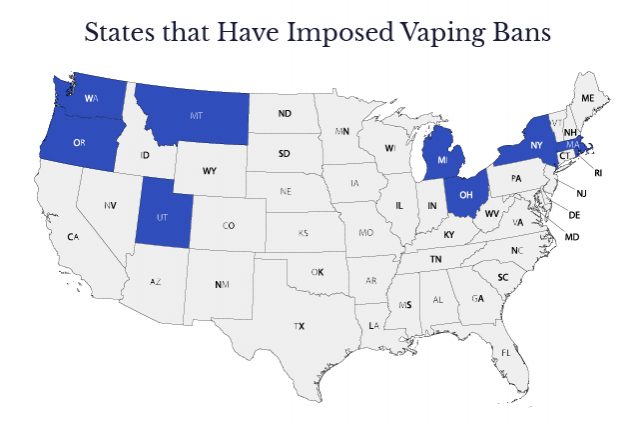
3.1 North Carolina: Leading the Enforcement Wave
North Carolina made headlines on July 1, 2025, by enacting one of the country’s strictest bans on disposable vapes. Under House Bill 900, the state banned the sale of all disposable vape products that have not received explicit FDA premarket authorization.
Retailers were granted a 60-day grace period to remove products or face escalating penalties:
- First violations trigger warnings and education.
- Second violations could result in fines up to $500 per product.
- Repeated non-compliance may lead to inventory seizures and license revocation.
The law is already having a real impact. Retailers report a 30–50% drop in vape sales, while compliance inspections began within the first week of the ban.
“We’re losing customers overnight,” said a Charlotte vape shop owner. “People drive across state lines to get their favorite disposables.”
The North Carolina Department of Revenue is assisting with enforcement, coordinating inspections and issuing educational materials to licensees (wral.com).
3.2 Wisconsin: Broad Ban Sparks Legal Challenge
Wisconsin’s Act 190, which also took effect on July 1, bans all vape products not authorized by the FDA, effectively outlawing most of the current market.
Unlike NC, Wisconsin’s law does not just target disposables — it includes open-system devices, e-liquids, and modsunless FDA-cleared.
Retailers have until September 1 to sell or dispose of their inventory. But the legal fallout has already begun:
The Wisconsin Vapor Association filed suit in federal court, alleging the law is “unconstitutional, discriminatory, and preempts federal regulatory authority.” (northernnewsnow.com)
The lawsuit claims the ban disproportionately affects small businesses, strips away consumer choice, and undermines existing federal frameworks like the PMTA process.
“This law pulls the rug out from under thousands of vape shop owners,” said advocacy director Thomas Callahan. “It doesn’t regulate—it erases.”
3.3 California: A Preemptive Strike With Environmental Focus
California isn’t waiting for FDA action. Legislators have introduced AB 762, which would ban all single-use disposable vapes starting January 1, 2026—regardless of FDA approval.
The bill, championed by Assemblymember Luz Rivas, is framed around both youth protection and environmental sustainability. It cites research that disposable vapes account for millions of pieces of lithium-powered e-waste, often discarded improperly in parks, schools, and storm drains.
“These products are designed to be used and tossed, and that’s exactly what’s happening—to the detriment of our environment,” said Rivas. (apnews.com)
If passed, California’s law could become a national template, potentially influencing policy in Washington, Oregon, and New York.
4. Federal Level: Courts & Regulatory Shift
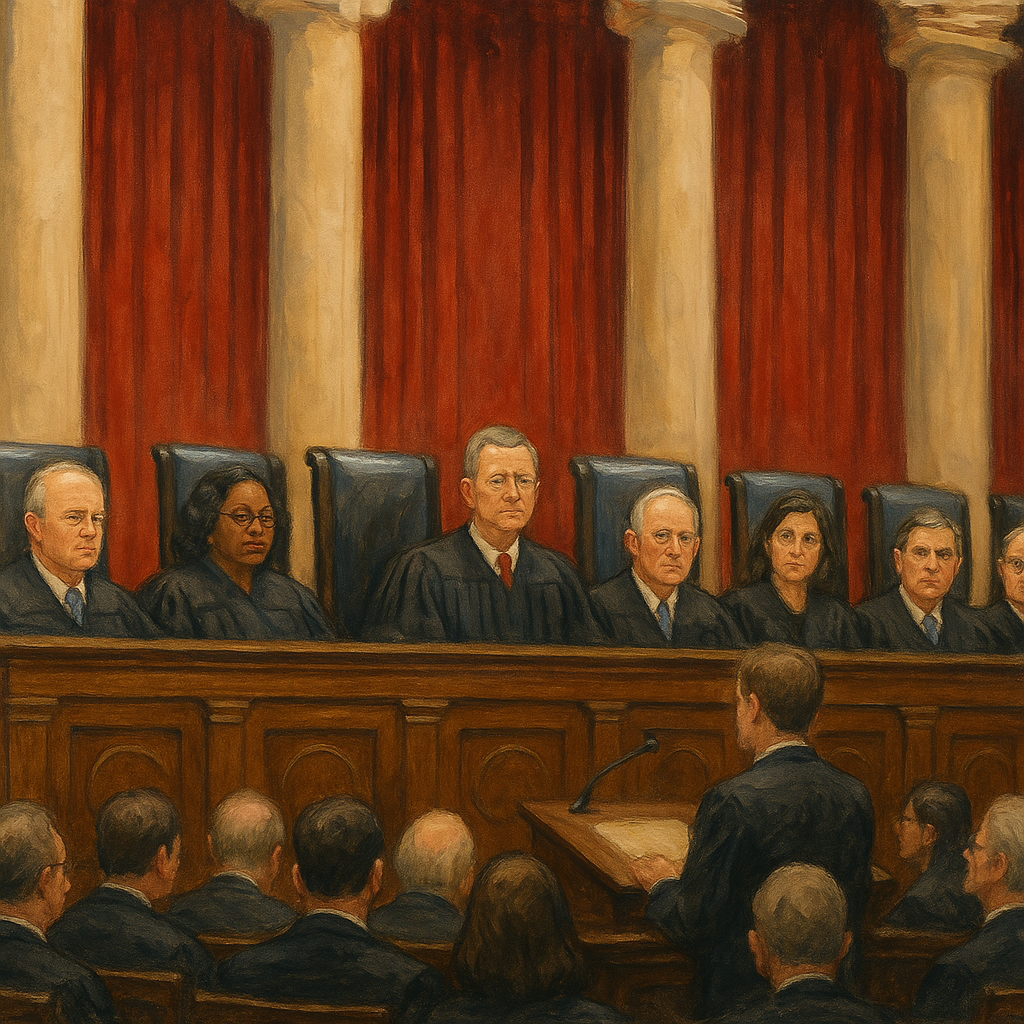
At the national level, 2025 has been a pivotal year for federal vape regulation. A pair of Supreme Court decisions and ongoing FDA enforcement efforts are shaping the landscape for manufacturers, retailers, and consumers alike.
4.1 Supreme Court Upholds FDA Denial of Flavored Vapes
On April 2, 2025, the U.S. Supreme Court ruled 9–0 in favor of the FDA’s authority to deny market access to flavored e-cigarette products.
The ruling stems from a case involving several manufacturers—including Turning Point Brands and Avail Vapor—whose flavored product applications were rejected by the FDA. The Court upheld the agency’s stance that flavored vapes “pose a disproportionate risk to youth” and that manufacturers failed to show adequate benefits to adult smokers.
Justice Samuel Alito, writing for the majority, emphasized:
“The FDA’s rejection of the applications was reasonably based on its statutory responsibility to protect public health.”
Public health advocates hailed the decision as a long-overdue affirmation of the agency’s regulatory strength.
“This is a historic moment,” said Yolonda C. Richardson, President of the Campaign for Tobacco-Free Kids. “It solidifies the FDA’s ability to keep flavored vapes—designed to appeal to kids—off the market.” (apnews.com)
4.2 Venue-Shopping Loophole: Regulatory Power Diluted?
In a second decision on June 20, 2025, the Court ruled 7–2 that vape companies can choose which federal circuit courtto challenge FDA denials. This practice, known as venue shopping, allows manufacturers to file lawsuits in districts with more industry-friendly judges.
Critics argue the ruling could weaken federal oversight, creating inconsistent standards across jurisdictions and bogging down enforcement.
“This opens the door to forum manipulation,” said former FDA lawyer Kathleen Hoke. “It creates a patchwork system where one court might approve what another rejects.”
Proponents, however, say the decision protects due process and allows for greater judicial review of what they view as overly aggressive FDA rejections.
4.3 PACT Act: Federal Enforcement Beyond the Storefront
Another pillar of federal oversight is the Prevent All Cigarette Trafficking (PACT) Act, amended in 2021 to cover e-cigarettes. Under this law:
- USPS is prohibited from shipping vaping products to consumers.
- Sellers must register with the Bureau of Alcohol, Tobacco, Firearms and Explosives (ATF).
- Age verification and tax compliance are mandatory.
The PACT Act has closed many online loopholes that previously allowed underage access to vape products via mail. However, private carriers like FedEx and UPS have uneven enforcement practices, creating a gray area for online sales.
“It’s a regulatory patchwork that still allows bad actors to reach kids online,” warned Matt Myers of the Tobacco-Free Kids Action Fund.
5. Industry & Advocacy Reactions
The recent wave of regulations and rulings has triggered sharp — and often opposing — reactions from across the vape industry, public health groups, and legal advocates.
5.1 Big Tobacco: Backing Enforcement… with a Catch
Major tobacco firms like R.J. Reynolds, Altria, and Imperial Brands have paradoxically supported stricter enforcement — but largely as a way to protect their FDA-authorized products from black-market competition.
In a recent Reuters interview, an Altria executive noted:
“We support a level playing field. It’s essential that the FDA enforce its rules so that compliant companies aren’t undercut by illegal imports.” (reuters.com)
Big Tobacco has also been lobbying Congress for faster PMTA timelines, arguing the slow pace disadvantages companies trying to comply legally while allowing unregulated brands to dominate store shelves.
5.2 Small Retailers: “We’re Being Wiped Out”
Independent vape shops — particularly in North Carolina and Wisconsin — say they’re being crushed by regulatory whiplash. Many relied heavily on flavored disposables, which now face bans or are being pulled from the market.
“This isn’t regulation. It’s annihilation,” said Charlotte vape retailer Darius Bell. “We’ve spent years building a customer base, and overnight it’s gone.” (wral.com)
Retailers argue that Big Tobacco benefits from the bans, as it can afford the costly and time-consuming PMTA process — while small businesses are left with unsellable inventory and few alternatives.
5.3 Public Health & Advocacy: Full Speed Ahead
Anti-vaping advocacy groups, including Campaign for Tobacco-Free Kids, Parents Against Vaping, and American Lung Association, are cheering recent moves.
They say the combined force of state bans, FDA denials, and Supreme Court backing is finally turning the tide against an industry that has long targeted young people with sweet, slickly branded products.
“This is a pivotal moment for youth health,” said Meredith Berkman of Parents Against Vaping. “But we must stay vigilant — the black market is growing just as fast.”
These groups also support California’s push to ban all disposables, regardless of flavor or FDA status, citing both addiction risks and environmental damage.
5.4 Legal Enforcement: New York’s Bold Move
On June 28, 2025, New York Attorney General Letitia James filed a major lawsuit against several distributors of flavored disposable vapes, including Puff Bar and Elf Bar.
The lawsuit alleges the companies violated state laws by marketing to minors and evading tobacco regulations. James called the products “a public health crisis disguised in fruit and candy wrappers.”
“These companies are targeting our children with candy-flavored poisons — and we will not allow it,” she said during a press conference. (apnews.com)
The suit seeks both financial penalties and a statewide injunction banning the sale of the targeted products.
6. What It Means for You
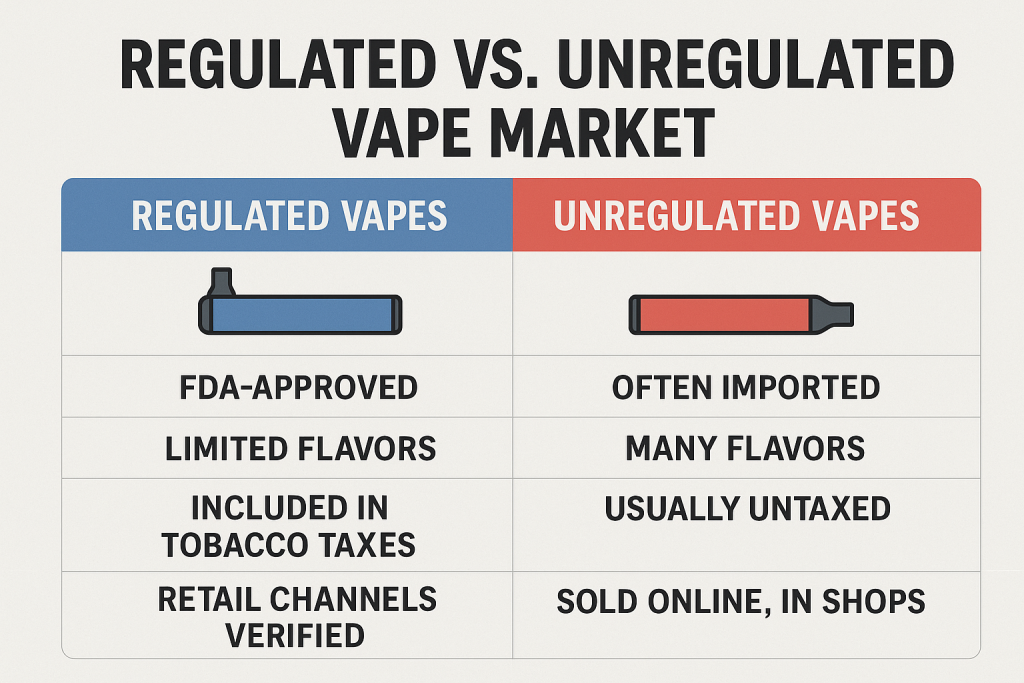
With policies and court rulings accelerating across the U.S., the practical impacts are already being felt nationwide. Whether you’re a consumer, health advocate, or part of the vape industry, these changes will affect how you access, sell, or regulate vape products.
6.1 For Consumers: Shrinking Access, Rising Risk
- Flavored and disposable vapes are rapidly disappearing from shelves in states like NC and WI, with other states considering similar bans.
- Mail-order access is drying up due to USPS restrictions under the PACT Act and state crackdowns on online sellers.
- Product variety is shrinking, and even open-system refillable vapes may face tighter scrutiny.
“If your favorite fruit or dessert flavor isn’t on the FDA’s authorized list, it’s probably illegal in your state now — or soon will be,” noted vape policy analyst Ben Cowan.
Consumers may turn to out-of-state sources or the black market, raising new risks around product safety, counterfeit nicotine levels, and legal exposure.
6.2 For Public Health: Progress and New Challenges
- Advocates expect a sharp decline in youth vaping rates, as flavored options disappear and enforcement strengthens.
- However, there’s concern about risk displacement — will teens switch to traditional cigarettes, synthetic nicotine pouches, or THC-based vaping?
- Environmental gains are also on the horizon, as laws like California’s AB 762 aim to eliminate millions of disposable devices from waste streams.
“We’re finally seeing momentum after years of policy paralysis,” said Karen Smith, a former CDC public health adviser. “But we need long-term vigilance.”
6.3 For the Vape Industry: Adapt or Exit
- Brands without FDA marketing authorization are effectively banned in many states.
- PMTA compliance is a costly, slow, and legally complex process, favoring large tobacco-backed companies.
- Independent vape shops are pivoting to open systems, CBD products, or shutting down altogether.
The new legal landscape will require businesses to:
- Track state-specific laws,
- Monitor ongoing FDA decisions,
- Invest in verified, long-term compliant product lines.
“The Wild West era of vaping is over,” said compliance attorney Linda Ford. “Now it’s regulation, litigation — or elimination.”
7. What’s Still to Come
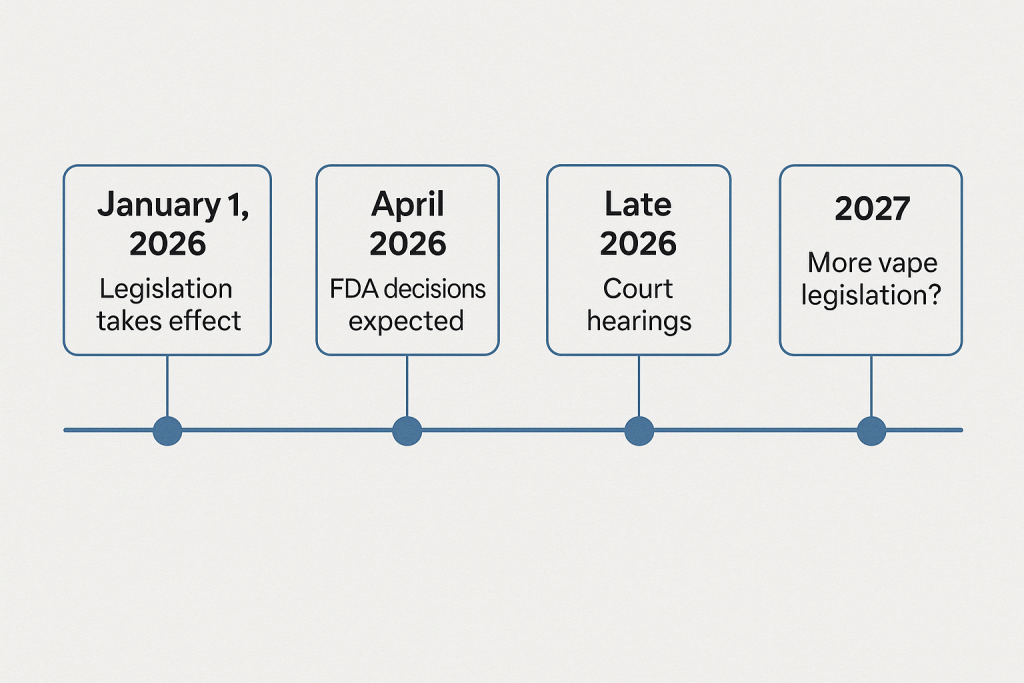
While much has already changed, the future of vaping in the U.S. remains uncertain and highly dynamic. Here’s what to watch in the months ahead:
7.1 Federal Legislation on the Horizon?
Though the FDA continues to lead regulation through the PMTA process, there is growing pressure in Congress to standardize vape policy nationally. Potential developments include:
- A federal ban on flavored vapes, preempting state laws.
- Streamlined PMTA procedures, making it easier (or harder) for companies to enter the market.
- New environmental regulations on disposable vape design and recycling.
“Congress may finally step in — if only to resolve the legal chaos left by conflicting state and federal rules,” said legal analyst Dana Bertram.
So far, no major federal vape legislation has passed, but multiple bills are in committee review.
7.2 Expansion of State and Local Bans
States like New York, Illinois, Hawaii, and Oregon are actively considering new restrictions modeled after California’s proposed AB 762.
City-level bans are also gaining traction:
- San Francisco was among the first to ban flavored vapes citywide.
- Chicago is reviewing legislation to prohibit all non-FDA-cleared products, regardless of flavor.
Expect more municipalities to follow suit in response to rising youth usage and environmental concerns.
7.3 Court Cases to Watch
- Wisconsin: Legal challenge to Act 190 could determine whether states can supersede FDA authority.
- New York: AG Letitia James’s lawsuit could establish liability standards for distributors of flavored disposables.
- Federal Circuits: Venue-shopping lawsuits will test how much latitude companies have in contesting FDA decisions.
The outcomes could reshape the scope of state control, the PMTA process, and corporate accountability.
7.4 The FDA’s Authorized Products List: The Next Gatekeeper
The FDA continues to review and publish decisions on vape applications. Only a small fraction of products have been authorized — mostly tobacco-flavored pod systems from major tobacco firms.
Coming FDA updates could:
- Expand the list to include menthol and open-system flavors, or
- Signal a move toward full-flavor prohibition.
“If it’s not on the authorized list, it’s at risk,” warned FDA Commissioner Robert Califf. “Retailers and manufacturers must stay current or face consequences.”
8. Conclusion

The U.S. vaping landscape in 2025 has shifted dramatically. With state-level bans tightening, the Supreme Court reinforcing FDA authority, and the industry splintering under legal pressure, the age of unregulated flavored and disposable vapes is rapidly closing.
For consumers, this means reduced access and rising enforcement. For public health, it could mean lower youth addiction rates and cleaner communities. For the industry, it’s a survival test that hinges on legal compliance, adaptability, and staying ahead of evolving regulations.
“As regulatory pressure builds, vaping’s future in the U.S. looks more restricted—and its impacts more contested—than ever.”
To navigate this uncertain terrain, knowledge is your most powerful tool—whether you’re a policymaker, parent, business owner, or consumer.
Stay informed. Stay compliant. And stay tuned.
📚 Sources
- WRAL: North Carolina Disposable Vape Ban Starts July 1, 2025
wral.com - Northern News Now: Wisconsin Ban on Non-FDA-Approved Vapes Sparks Legal Challenge
northernnewsnow.com - AP News: California Lawmakers Propose Bill Banning Single-Use Vapes
apnews.com - Washington Post: Supreme Court Allows Vape Companies to Choose Courts for FDA Challenges
washingtonpost.com - Politico: FDA Wins Supreme Court Backing on Flavored Vapes
politico.com - Reuters: Big Tobacco Demands Enforcement Against Black Market Vapes
reuters.com - AP News: NY Attorney General Sues Vape Distributors Over Flavored Products
apnews.com - ATF: PACT Act and E-Cigarette Mail Restrictions Overview
atf.gov

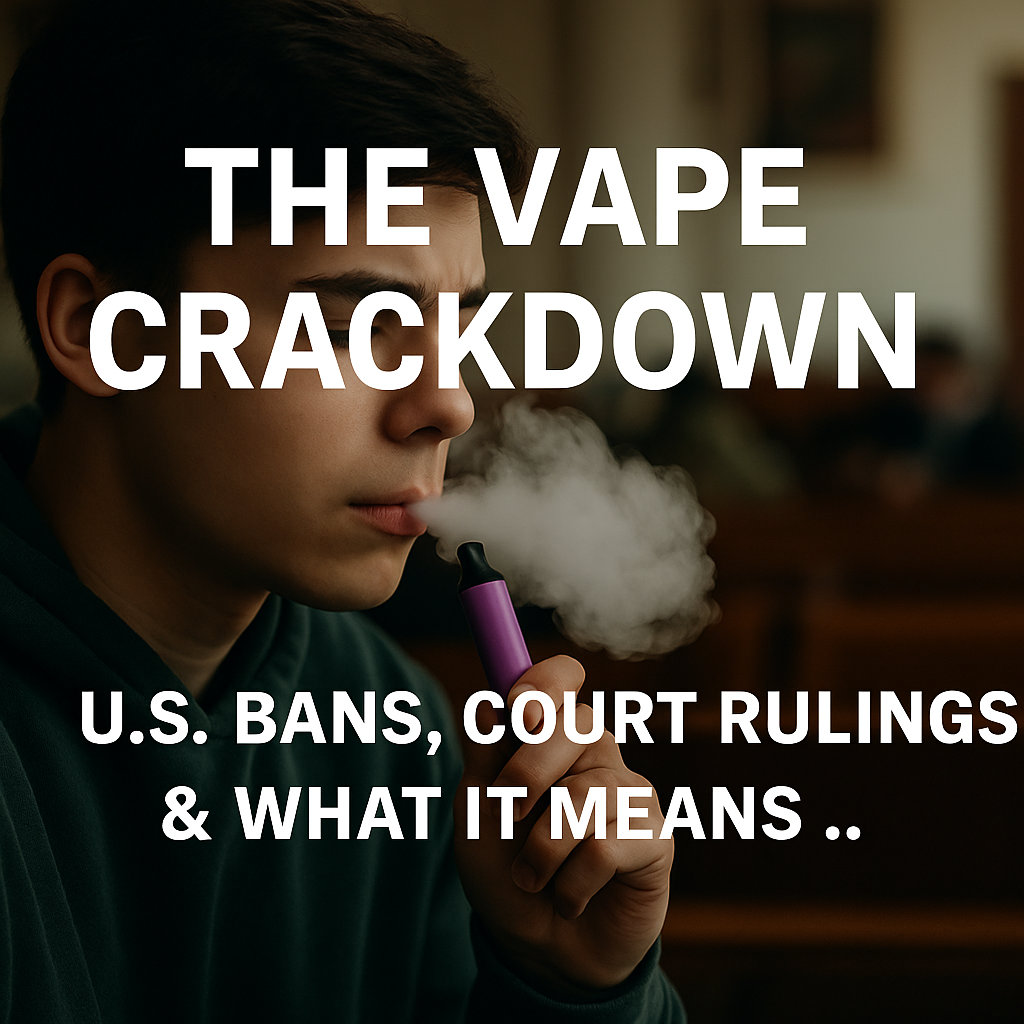

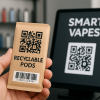

Add comment